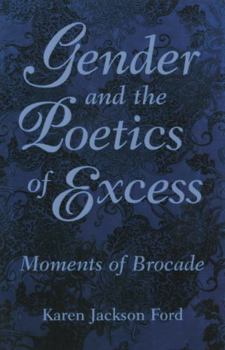Gender and the Poetics of Excess: Moments of Brocade
Select Format
Select Condition 
Book Overview
Gender and the Poetics of Excess: Moments of Brocade by Karen Jackson Ford The argument posed in this analysis is that the poetic excesses of several major female poets, excesses that have been typically regarded as flaws in their work, are strategies for escaping the inhibiting and sometimes inimical conventions too often imposed on women writers. The forms of excess vary with each poet, but by conceiving of poetic excess in relation to literary decorum, this study establishes a shared motivation for such a strategy. Literary decorum is one instrument a culture employs to constrain its writers. Perhaps it is the most effective because it is the least definable. The excesses discussed here, like the criteria of decorum against which they are perceived, cannot be itemized as an immutable set of traits. Though decorum and excess shift over time and in different cultures, their relationship to one another remains strikingly stable. Thus, nineteenth-century standards for women's writing and late twentieth-century standards bear almost no relation. Emily Dickinson's do not anticipate Gertrude Stein's or Sylvia Plath's or Jayne Cortez's or Ntozake Shange's. Yet the charges of indecorousness leveled at these women poets repeat a fixed set of abstract grievances. Dickinson, Stein, Plath, Cortez, and Shange all engage in a poetics of excess as a means of rejecting the limitations and conventions of "female writing" that the larger culture imposes on them. In resisting conventions for feminine writing, these poets developed radical new poetries, yet their work was typically criticized or dismissed as excessive. Thus, Dickinson's form is classified as hysterical and her figures tortured. Stein's works are called repetitive and nonsensical. Plath's tone is accused of being at once virulent and confessional, Cortez's poems violent and vulgar, Shange's work vengeful and self-righteous. The publishing history of these poets demonstrates both the opposition to such an aesthetic and the necessity for it. Karen Jackson Ford is a professor in the English department at the University of Oregon.
Format:Paperback
Language:English
ISBN:1604732555
ISBN13:9781604732559
Release Date:February 2009
Publisher:University Press of Mississippi
Length:272 Pages
Weight:0.92 lbs.
Dimensions:0.6" x 6.0" x 9.0"
Customer Reviews
0 rating





